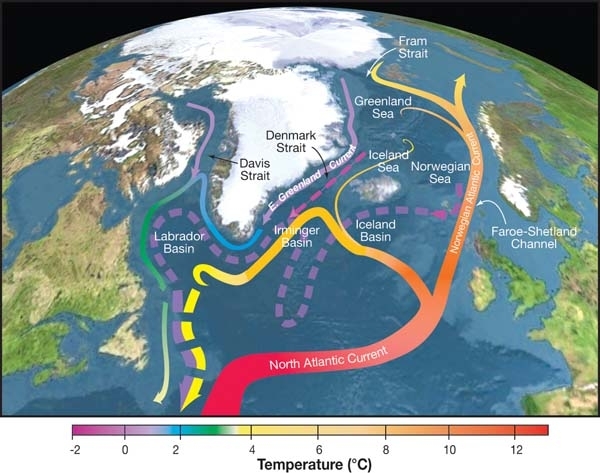Context:
A new study published in Environmental Research Letters says that the collapse of a major ocean current system called the Atlantic Meridional Overturning Circulation (AMOC) could happen in the future — and it’s no longer seen as unlikely. This system, which includes the Gulf Stream, helps move warm water around the world and plays a big role in keeping the climate stable, especially in Europe and North America.
About Atlantic Meridional Overturning Circulation (AMOC):
The Atlantic Meridional Overturning Circulation (AMOC) is a large system of ocean currents in the Atlantic Ocean.
· It is like a giant conveyor belt that moves warm water from the tropics up to the north, and then sends cold water back down south deep under the ocean.
· It’s powered by differences in water temperature and saltiness, and it helps move heat, nutrients, and carbon around the planet. This makes it very important for the climate, especially in Europe, and for ocean life.
Implication If AMOC Weakens or Collapses:
Research suggests that an AMOC shutdown would lead to:
· Major cooling over Northern Europe and Eastern North America
· Sea ice expansion in the North Atlantic
· Droughts in Africa and South America
· Disruption to monsoons in Asia
· A potential amplification of El Niño events
A 2016 paper in Science Advances emphasized the dramatic climate consequences of an AMOC collapse, noting "markedly different climate responses" across regions, including significant southward shifts of tropical rain belts.
Why Is AMOC Slowing Down?
Several factors are contributing to the weakening of AMOC:
· Melting Greenland and Arctic ice is releasing large volumes of freshwater into the North Atlantic. Unlike saltwater, freshwater is less dense and disrupts the sinking mechanism critical to AMOC flow.
· Changing precipitation patterns due to Indian Ocean warming may also play a role. A 2019 study suggested increased rainfall over the Indian Ocean and decreased rainfall over the Atlantic leads to higher salinity in the Atlantic, which could temporarily strengthen the AMOC — but only while the imbalance persists.
Conclusion:
The study highlights the urgent need for global climate action. While the actual collapse of AMOC may still be several decades away, the processes that lead to it could be locked in much sooner. Given the potentially catastrophic consequences for global weather, sea levels, agriculture, and biodiversity, scientists argue that mitigating climate change must remain a top global priority.







